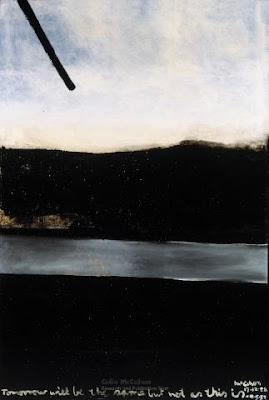Tacita Dean, Tate Christmas Tree 2009
In sound, in text, in image - and in concept - there is a moment when the tuning seems to have found that perfect note. Without static, free from unnecessary embellishment, focussed and pure, there is the sense of an immaculate moment. Tacita Dean's Tate Christmas tree seems such a moment. Like Dean's work in film and photography, the tree embodies aspects of memory, of pasts present. The tree is an iconic Christmas tree - a Nordmann fir - decorated only with candles. Made from beeswax, the candles are calibrated to mark the diurnal fading of light. Lit at 4pm when the light fades in the gallery, they burn for precisely 2 hours until the gallery closes, underscoring the passage through twilight. The lighting of the candles, their eschewing of technology, and the image of the candlelight, suffuses the tree with the ritual of Christmas's past.
Tacita Dean: "I was struck when I arrived in Berlin by the simplicity of Christmas there. I felt the Germans had managed to hold onto something of its purity and magic despite commercial pressures. As many of my films encompass twilight and the transition from day to night, it seems appropriate to light the candles at this moment of each day."
Seasons Greetings ...


 Gitta Gschwendtner, Animal Wall, Cardiff Bay, Wales
Gitta Gschwendtner, Animal Wall, Cardiff Bay, Wales
 R&SIE[N], 'I'm Lost in Paris' House, Paris, France
R&SIE[N], 'I'm Lost in Paris' House, Paris, France Richard Wright
Richard Wright 








 Books of the Dead (containing ash), California, 2001, JB
Books of the Dead (containing ash), California, 2001, JB Avonhead Park Cemetery, 2002, JB
Avonhead Park Cemetery, 2002, JB




 Stanley Kubrick, 2001: A Space Odyssey, 1968
Stanley Kubrick, 2001: A Space Odyssey, 1968


























